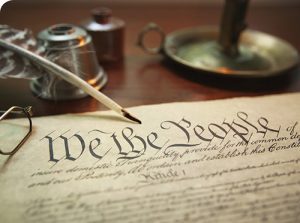By Lawrence C. Walters (BA ’81)
The survival of a free society depends upon its citizens.
There are at least two ways to think about citizenship. The first sees citizens as having certain rights that should be protected by law. Those who hold this view are concerned mostly with defending individual freedoms. There is no question that rights are an important aspect of citizenship. All too often, however, this approach to citizenship descends into a type of consumerism: citizens see themselves as no more than customers of government.
Consumer citizenship is something we assert only occasionally. We exercise our right to vote every year or two, maybe—when we go to the polls, or “the store,” to choose what we want from a list. If we don’t like what is on the list, we may not even go to the store. If there is a problem in the community, we expect the government to deal with it. Most of the time, though, we just want to be left alone.
The second vision of citizenship, captured well by Peter Block, is more demanding. “A citizen is one who is willing to be accountable for and committed to the well-being of the whole,” he said. “That whole can be a city block, a community, a nation, the earth. A citizen is one who produces the future, someone who does not wait, beg, or dream for the future.”1
This view of citizens as active builders seems more consistent with what our Heavenly Father expects of us: “Governments were instituted of God for the benefit of man; and . . . he holds men accountable for their acts in relation to them, both in making laws and administering them, for the good and safety of society” (D&C 134:1). But we are not asked to bear this responsibility alone. Because of our shared responsibility and because we are so much more effective together than we are individually, we must actively engage with others.
seems more consistent with what our Heavenly Father expects of us: “Governments were instituted of God for the benefit of man; and . . . he holds men accountable for their acts in relation to them, both in making laws and administering them, for the good and safety of society” (D&C 134:1). But we are not asked to bear this responsibility alone. Because of our shared responsibility and because we are so much more effective together than we are individually, we must actively engage with others.
Active citizens participate in collective reasoning—joining with others to identify issues, giving and receiving information, and taking counsel together. In this process citizens listen to others with a desire to understand their views.
Inevitably, such deliberative processes identify conflicting points of view. Serious deliberation with people we don’t agree with can be slow and frustrating—especially if we want the Lord’s help, because then we have to get rid of all our unkind thoughts so that the Spirit can be unrestrained. My experience suggests that we make much more progress when we put aside the idea that people who don’t agree with us are ignorant of the facts, stupid, or evil and focus instead on what we have in common. Active citizens must strive to synthesize and reconcile conflicting views, values, and priorities. This is not easy to do.
One of the best examples of this type of deliberative process is the convention that produced the U.S. Constitution. The delegates came with strong and conflicting personal and regional interests. What they shared was a commitment to some very basic principles of freedom and governance. It took months of collaboration and, at times, contentious discussion, but the result has blessed the lives of millions.
When Abraham Lincoln dedicated the cemetery at Gettysburg, he spoke of “the great task remaining before us”—that of preserving a free and democratic government. This task is not finished, and it never will be. It will always require active citizens to maintain a “government of the people, by the people, for the people.”2
This essay is adapted from a devotional address by Lawrence C. Walters, a professor in the BYU Romney Institute of Public Management, on April 1, 2014. The full text is available at speeches.byu.edu.
Notes
1. Peter Block, Community: The Structure of Belonging (San Francisco: Berrett-Koehler Publishers, 2008), p. 63.
2. Abraham Lincoln, Gettysburg Address, Nov. 19, 1863.






